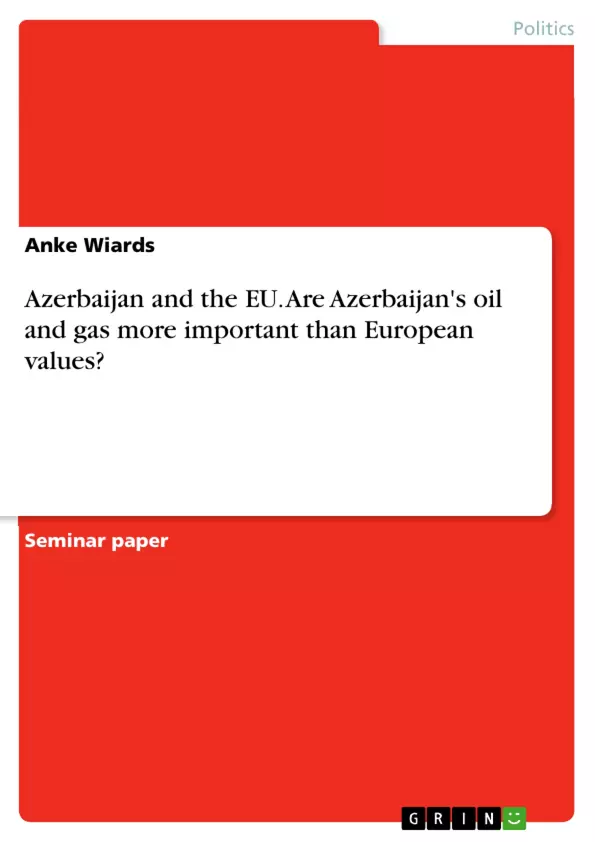This paper asks the following questions: How did this politically controversial country nevertheless become one of the EU's most important energy suppliers? Are Azerbaijan's oil and gas more important than European values?
Since the 19th century, Azerbaijan has been known worldwide as one of the most important oil suppliers. At the beginning of the 20th century, Azerbaijan supplied the Russian Tsarist Empire with its oil, during the Second World War its successor, the USSR, and since the late 1990s Azerbaijan has aspired to play an important role in European energy security. Today, Azerbaijani oil and gas are of great importance to the EU and many other countries in the region.
After Azerbaijan joined the European Council in 2001, several agreements and contracts for the supply of natural gas and oil followed. A new pipeline was even built to transport the minerals to the EU more quickly and easily. This seems to be at odds with the current governance and human rights situation in the country. Again and again, major accusations have been made against the government: war crimes, persecution of political opposition, restrictions on media freedom and freedom of expression, and generally no democratic governance.
Inhaltsverzeichnis (Table of Contents)
- A. Introduction
- B. Main part
- 1. Azerbaijan
- 1. History
- 2. Economy
- 3. Policy
- a) The Constitution
- b) Elections
- c) Nagorno-Krabakh
- II. Cooperation with the European Union
- 1. European Council and its values
- 2. Economic relations of Azerbaijan
- 3. Energy partnership
- 1. Azerbaijan
- C. Conclusion
- D. Annex
Zielsetzung und Themenschwerpunkte (Objectives and Key Themes)
This work provides a comprehensive overview of the relationship between Azerbaijan and the European Union. It analyzes historical developments, economic relations, and political cooperation between the two entities, highlighting key aspects of Azerbaijan's domestic and international policies.
- Azerbaijan's history, economy, and political system
- The role of the European Council and its values in shaping EU-Azerbaijan relations
- Economic ties between Azerbaijan and the EU, including energy partnerships
- The Nagorno-Karabakh conflict and its implications for regional stability and EU engagement
- The impact of Azerbaijan's geopolitical position on its relations with the EU
Zusammenfassung der Kapitel (Chapter Summaries)
The introduction sets the stage for the analysis, outlining the scope and purpose of the work. The main part delves into the specifics of Azerbaijan, examining its history, economy, and political system. This includes an analysis of the country's constitution, electoral processes, and the ongoing conflict in Nagorno-Karabakh. The chapter on cooperation with the European Union explores the European Council's values, the economic relations between Azerbaijan and the EU, and the strategic energy partnerships that have developed.
Schlüsselwörter (Keywords)
Azerbaijan, European Union, international relations, history, economy, politics, Nagorno-Karabakh, European Council, economic cooperation, energy partnership, geopolitical position, regional stability.
Frequently Asked Questions
Why is Azerbaijan a strategic partner for the EU?
Azerbaijan is one of the most important energy suppliers, providing oil and natural gas that are crucial for European energy security.
What is the main controversy in EU-Azerbaijan relations?
The controversy lies in the conflict between the EU's dependence on Azerbaijani energy and the country's poor record on human rights and democracy.
What are the human rights concerns in Azerbaijan?
Accusations against the government include persecution of political opposition, restrictions on media freedom, and lack of democratic governance.
How important is the Nagorno-Karabakh conflict?
The conflict is a major factor in regional stability and significantly shapes Azerbaijan's foreign policy and its relations with the EU.
When did Azerbaijan join the European Council?
Azerbaijan joined the European Council in 2001, which was followed by several agreements on energy supply.
- Quote paper
- Anke Wiards (Author), 2021, Azerbaijan and the EU. Are Azerbaijan's oil and gas more important than European values?, Munich, GRIN Verlag, https://www.grin.com/document/1167780



